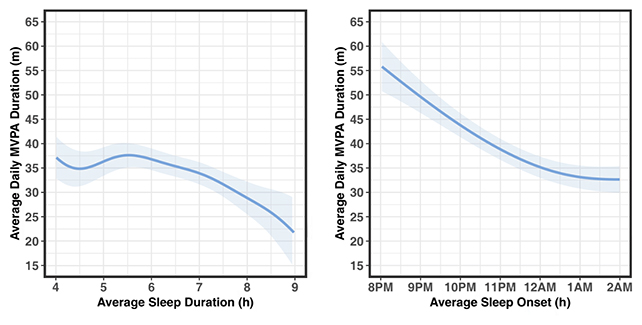If you're determined to log more minutes of exercise tomorrow, going to bed earlier tonight could help, according to a new study that analyzed the relationship between bedtimes and subsequent physical activity levels.
The study was led by researchers from Monash University in Australia, and while it doesn't definitively prove that heading to bed early means you're likely to exercise more the next day, it suggests there's a significant connection.
And the sheer amount of data collected for the study supports that connection: data from wearables for 19,963 people was logged over the course of a year, giving the researchers information on almost six million night-and-day reference points.
"These insights carry meaningful implications for public health," says psychologist Josh Leota, from Monash University.
Related: One Fitness Accessory Makes You Up to 7 Times More Likely to Stay Active
"Rather than just promoting sleep and physical activity independently, health campaigns could encourage earlier bedtimes to naturally foster more active lifestyles."
Overall, an earlier bedtime matched up with more moderate-to-vigorous exercise the next day, the data showed. Those who went to bed at 9pm logged an average of 30 minutes more than those who went to bed at 1am, for example, and 15 minutes more than those with an 11pm bedtime (the average bedtime across all participants).

The amount of sleep mattered too: those who banked an average of 5 hours logged 41.5 more minutes of exercise compared to those who banked an average of 9 hours (though the benefits of exercise may be counterbalanced by the effects of sleep deprivation).
Another key finding was that when individuals went to bed earlier than normal, but still banked the same amount of sleep that they usually did, they tended to hit their personal bests in terms of activity time the next day.
There are a few reasons why this might be happening, the researchers suggest. Later bedtimes may indicate people who are busier in general, and might also mean there's less of a likelihood to lie in or hit the snooze button the next day – though wake-up times weren't included in the study data.
"Standard 9-to-5 routines can clash with the natural sleep preferences of evening types, leading to social jetlag, poorer sleep quality, and increased daytime sleepiness – which can all reduce motivation and opportunity for physical activity the next day," says Leota.
Factors controlled for in the study included age, body mass index, and whether it was a weekday or weekend. The researchers also found a similar but less prominent relationship in a second, more diverse set of data from 5,898 people, backing up the initial results.
As this study is based on a correlation, it may still be that other factors, like naturally being a 'night owl', is contributing to both the late sleep and lower exercise times. Until more research can pry such other variables apart, it's not possible to draw firm conclusions.
However, we know both sleep and exercise are fundamental parts of living a healthy life, and the study points to a simple intervention many of us could consider to boost our well-being: moving our bedtimes forward a little bit.
"Sleep and physical activity are both critical to health, but until now we didn't fully grasp how intricately connected they are in everyday life," says psychologist Elise Facer-Childs, from Monash University.
"Our findings are consistent across different populations, and show that if you can get to sleep earlier than usual whilst keeping your sleep duration the same, you may be more likely to increase your physical activity the following day."
The research has been published in PNAS.